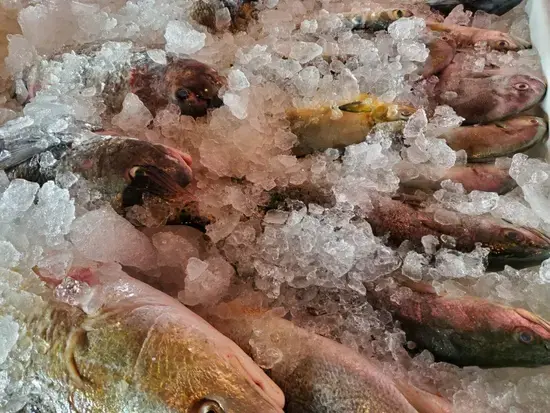This letter features reporting from "Toxins and Mislabeling Threaten NC Seafood" by Jack Igelman, a Pulitzer Center reporting project
Dear Congresswoman Eleanor Holmes Norton,
I am Chloe, a fifth grader from Washington, D.C. I attend the public School Without Walls at Francis Stevens. I am writing to you because I want to address a current dilemma that affects numerous people and animals across the globe. This problem is runoff—specifically industrial and agricultural runoff. I believe that after you finish reading this letter, you’ll realize how destructive runoff can be and how we need to do everything we can to combat this ghastly problem. I have also offered some solutions to the problem at the end of the letter.
Agricultural runoff all starts with nitrogen. It is beneficial to many farmers, as it is a critical component of growing healthy, lush crops, so they use it in fertilizers. But many farmers apply too much of this nitrogen fertilizer, so when it rains, the excess nitrogen gets washed off the plants and into local waters. Extra nitrogen in bodies of water causes harmful algae blooms to occur. When the algae die, they decompose the oxygen particles in the water. Without oxygen, marine life suffocates. I recently read an article on the Pulitzer Center website that explains how toxins and mislabeling affect fisheries. An aquatic ecologist and professor named Hans Paerl was quoted in the article. He said, “There is every reason to be concerned from a human use perspective…You cannot swim in waters impacted by [harmful algae blooms.] Nor can the toxic substances produced by the blooms be safely ingested by humans.” Yes, this is true. Algae blooms release toxic chemicals that cause skin irritation if you touch them—even irritation in the lungs. Additionally, accidental consumption of these toxins leads to headaches, diarrhea, vomiting, and nausea. There are numerous people around the world that suffer the effects of runoff—specifically, fishing villages. Their economies are almost entirely dependent on fishing, and the citizens’ diet consists mostly of locally caught fish.
This is a problem. The local waters around fishing villages could be contaminated with multiple toxins, including one known as Polychlorinated Biphenyl (PCB). PCBs are man-made chemicals that you used to be able to find in cable insulation, motor oil, hydraulic systems, floor finish, and more. But it was banned in America during the 1970s because it was extremely problematic. It affected numerous citizens’ health and the environment. The worst part is that PCBs are still present in our country and around the world today because they take a while to break down.
Like I said before, PCBs affect fishing villages the most. Fish caught from the local waters could be contaminated with this toxin, and that causes multiple problems for the residents of these small towns. Residents who frequently eat infected fish could get multiple types of cancer, such as gallbladder, liver, brain, and breast cancer. Other adverse health effects could include weight loss, paralysis in the limbs, vision loss, and a slower immune system. Additionally, those fish that were caught in the fishing villages get shipped across the country, and then into seafood restaurants, and then unassuming stomachs. Jack Igelman, the author of the article from the Pulitzer Center stated, “The question may not only be whether one can catch a fish but whether the catch is edible. And if you decide to dine on seafood someone else caught, in a time of changing seas, are you sure about what you are really eating?”
Seafood diners are plentiful around Washington, D.C., where I live. Some of the fish served there are caught from the Potomac River, which is highly contaminated with toxins and trash. Like Jack Igelman said, can we feel safe while eating fish caught from local waters? The river is greenish-brown, and the ducks’ feathers are mangled. The Georgetown Waterfront smells putrid, like dead fish and dirty birds. You can barely see the catfish hidden by the murky water. No one is allowed to swim in the Potomac River or the waterways flowing into it. This same thing happens all around the world. Did you know that runoff and the problems that it causes are responsible for 80% of pollution in marine environments? This dilemma is even more disastrous than trash. We need to conquer runoff, so I propose a few solutions: Organize a tree planting event. But don’t just put the trees anywhere—plant them right where the city borders the Potomac and Anacostia Rivers. I think that this would be helpful here in Washington, D.C. because the trees could soak up excess nitrogen and prevent it from causing harmful algae blooms in the river. Next, encourage citizens to be more careful about what seafood they eat and where they eat it. Also—and this is an important one—enforce mandates on how much nitrogen farmers can apply to their plants. Lastly, make sure that waste sites containing PCBs and other toxins are well maintained, so that no more toxic chemicals end up in our river.
For the good of our Earth and all its inhabitants, please do what you can to tackle the issue of harmful runoff.
Sincerely,
Chloe H.T. Carrdus

Chloe is a fifth grader who attends School Without Walls at Francis-Stevens in the District of Columbia, but she often spends school breaks in New Hampshire. She lives with her parents, little brother, and weird orange cat. She enjoys everything from baking cakes inspired by her favorite baking show to playing card games with her dad, but especially loves creative writing. She hopes to become a successful author one day.
Read more winning entries from the 2021 Local Letters for Global Change contest!
